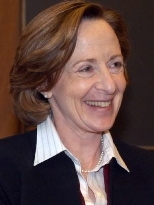Susan Hockfield described the first six hours of her first full day as president of MIT as "so far, so terrific. No big surprises except a lovely homemade cake with the Wright brothers' airplane on top."
Hockfield seemed right at home in her new office with its pale marble fireplace, polished bookshelves and view of Killian Court and the Charles River. Currently, the shelves hold family photos and the two tables, flowers. She has moved the presidential desk 90 degrees to the west.
Hockfield has spoken often of the value of collaboration and of community, and she was quick to credit her success today as a scientist and as an administrator, to "fabulous mentors and advisors, lots and lots of them. I always encourage students to find and use as many mentors and advisors as they can," said Hockfield. "The practice of science is so complex, no one person or teacher can do it all."
She singled out her core staff during her six-year tenure as provost and graduate school dean at Yale for praise, noting she had already discerned that same devotion and selflessness in people she'd met at MIT. "I didn't know until I became part of administration how many people facelessly dedicate their lives to students of the Institute," she said.
In her navy blue suit, low matching pumps and striped shirt, Hockfield, a Chicago native, presents an accessible yet businesslike image. She laughs readily and relishes the process of thoughtful response. A question about her hobbies struck her as funny--but how could it not, with a scientific and leadership career, a family and a new Golden Retriever?
"I've been blessed that I have always loved my work," she said.
Warming to the topics of teaching and research, Hockfield said, "I loved being a scientist. I found neuroscience endlessly fascinating. When I got my first job in a lab, I felt I had found the thing I'd always been looking for. I loved working in labs. I loved the hands-on work and the sociology of the people in the lab. Science is about regular failures within the context of knowing you are moving towards success. We persist because we enjoy the elements--the activities--in what we do."
Hockfield, 53, reflected briefly on the history of American science and the promise of American education, with MIT sustaining its leadership role. When she was in grade school, the space race began, catalyzed by Sputnik I, the former-Soviet Union's basketball-sized satellite that circled the Earth in 1957.
"Sputnik was a wake-up call. It raised a sense of enthusiasm for science and math, and gave Americans a compelling interest, a survival interest, in competing with the Russians. I think our nation could use some of that sense of urgency today," she said. "I'd like to see our nation continue to be the fount of ideas for the future of innovation and invention for bettering human life."
Hockfield's vision for MIT is to "play a significant role in reinvigorating science and technology education, communicating what we do to kids in our own nation and around the world," she said.
"The 20th century was the American century. As we embark on the 21st century, it's looking like it will be the science and technology century. It could also be the global century. Either way, MIT should lead the way," she said.
A discreet knock on the office door came; the Associated Press was here to interview the new president. On a shelf just outside Hockfield's office sat the day's little surprise, the white frosted layer cake from the "Institute for Hacks, Tomfoolery and Pranks," complete with an explanatory note.
Seven hours into her first full MIT day, the cake still made Hockfield smile. Never mind how the layers had slid since early morning, so the frosted dome leaned like a heavy eyelid over Building 10. The paper plane, the once-impossible dream of flight, was pointed toward Killian Court, where inauguration will take place next May.
A version of this article appeared in MIT Tech Talk on December 8, 2004 (download PDF).






